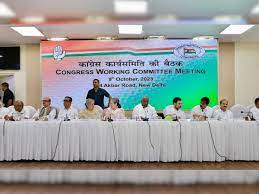Harihar Swarup
As the conflict between Israel and Hamas intensifies and the horrifying scale of the October 7 attack on civilians emerges, there is a growing disquiet in a section of the Congress about the working committee resolution that did not mention Hamas or condemn the terror attack .
In fact, the first step towards what can be seen as a course correction has come. Sources in the Congress party said how the resolution, first reported in newspapers, came to be issued, was being investigated and there was a move towards taking a more nuanced position closer to one taken by the party’s communication chief Jairam Ramesh.
Without referring to the CWC resolution, or Jairam’s comments, congress spokesperson , Pavan Khera much later said, “ The Congress univocally condemns the attack on innocent civilians of Israel.”
Khera’s statement went beyond Ramesh’s formulation that had condemned “brutal attacks” on Israelis but without naming Hamas or the terror attack as the perpetrators. And it was much stronger than CWC that had been silent about Hamas or its terror attack on Israel. “We have always believed”, Khera continued, “that the legitimate aspiration of the people for a life of self respect, equality and dignity can be only fulfilled through a process of dialogue and negotiations ensuring national security for the people of Israel”.
With Khera’s words, the Congress has come out with three statements on the war in a week, showing the differences within that it has tried to synthesize. Former Home Minister P. Chidambaram, however, felt that both the statements — Ramesh and the CWC resolution — should be “read together” and both sides must stop violence. He said it was BJP that had changed its position, first by supporting Israel and then talking about the rights of the Palestinians.
Talking to four senior Congress leaders, it became evident that after the conflict was discussed in the CWC, a brief resolution was drafted and amendments made before being distributed among members of the body. To get around the differences on the issue, Congress President Mallikarjun Kharge decided the resolution would not be passed, saying the CWC should stick to discussing the demand for a caste census. “There was even a thumping of desks at this (welcoming Kharge’s decision). Rahul Gandhi also thumped the table, agreeing with the decision”.
Another Congress functionary said the resolution was not supposed to be made public, admitting, “We don’t know how it happened, and who did it.” While some Congress leaders acknowledged that “it (the CWC resolution) did not represent the prevalent view, some mischief was done and the resolution was released”, others labelled it a faux pas.
“Mistake or mischief, that (not condemning HAMAS) is not our stand”, said a senior Congress leader. “A terror attack is a terror attack. There is no way the party can condone an attack on civilians”.
It was Ramesh who first took a nuanced position on behalf of the party. He condemned the “brutal attacks on the People of Israel” while reasserting India’s support for the “legitimate aspiration of the Palestinian people for a life of self-respect, equality and dignity”.
Significantly, he was also not critical of Prime Minister Narendra Modi’s statement that India stands for Israel at its most difficult moment. This represented a change in the Congress’s position. In the recent past, the party has criticized the government for supporting Israel at the cost of Palestinians.
As geopolitical realities changed over the years and India’s relationship with Israel, and US deepened, the Congress position underwent a subtle shift. It was Prime minister P V Narasimha Rao of the Congress who first established diplomatic ties with Israel in 1992 and announced it while Palestine Liberation Organization (PLO) supremo Yasser Arafat was in India (Rao had taken Arafat into confidence).
Under Narendra Modi, the relationship reached a new level. The 12U2 group—a grouping of India, Israel , the US and UAE that is sometimes called the West Asia Quad—and recently forged IMEC (the India Middle East-Europe) Economic Corridor are signs of change. (IPA )


